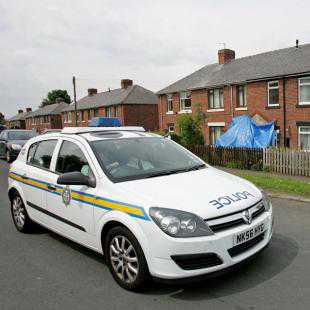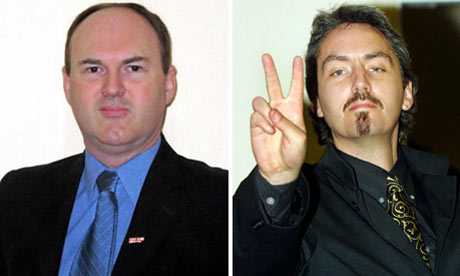EU elections: Nick Griffin prevented from reaching Manchester count by demonstrators as far-right party wins seat in Yorkshire and Humber
Martin Wainwright and agencies

The British National party tonight won a seat on the European parliament for the first time in its history after receiving 120,139 votes in the Yorkshire and Humber region.
Andrew Brons took a seat from Labour with almost 10% of the vote in the region, up by 2% on the last election.
Andy Burnham, the health secretary, said the result was a “sad moment for British politics”.
William Hague, the shadow foreign secretary, who is from south Yorkshire, said the party had taken votes from Labour.
The BNP won one of six seats in the region while Labour lost one of the two seats it held at the last election.
The BNP achieved 16% of the vote in Barnsley, nearly 12% in Doncaster and 15% in Rotherham – all Labour strongholds.
Brons said after the count: “The onslaught against us has been more than against any other party in recent times, but somehow we’ve overcome it. Despite the lies, despite the money, despite the misrepresentation, we’ve been able to win through.”
His victory followed particularly dramatic rises in the BNP vote in old Labour heartlands such as Barnsley, where it went from 8% to 17%, while Labour’s fell from 45% to 25%.
Brons retired last year as a politics and government teacher at Harrogate College, and re-entered active politics. He stood five times for the National Front in the 1970s after a brief spell as its leader, which ended in internal quarrels. He joined the British National Socialist party as a teenager.
Welcoming Brons’ election, Nick Griffin, the BNP leader, said: “We’re here to look after our people because no one else is.” He added that feelings were particularly strong in Yorkshire. “This is ordinary decent people in Yorkshire kicking back against racism, because racism in this country is now directed overwhelmingly against people who look like me.”
He said that immigration had become harmful to Britain, particularly with the spread of radical Islam. “Take Bradford – it isn’t immigration that’s happening there, it’s colonialism,” he said.
In Manchester, protesters prevented Griffin from reaching the European elections count for the constituency where he is standing: the North West.
Griffin finally reached Manchester town hall in a police van after his vehicle and bodyguards were pelted with eggs by a noisy group who yelled: “Fascist scum.”
His party was struggling against a strong showing by the United Kingdom Independence party and the Greens in its attempt to secure the figure of around 8.5% that would win one of the region’s eight seats.
At 10.30pm, declarations from around one-fifth of the North West’s 39 counting district left Griffin, who tops the party’s list for the region, just over a percentage point short.
The tally gave the Conservatives 112,710 – 25% of the vote – putting them on course for three seats.
Labour were running second, with 99,555 votes and many traditional strongholds still to declare, and the likelihood of two seats.
Ukip was close behind, with 68,340, and the Liberal Democrats had 60,315, guaranteeing the parties a seat each.
The BNP were on 39,352 and the Greens 36,260, leaving the battle for the eighth seat between either of them and Ukip.
“It’s on a knife-edge here in the North West,” Griffin said.
“We are on tenterhooks, but we’ve done well in Liverpool and over in Yorkshire, especially in Barnsley.”
Turnout in the North West was 31.9%, with the biggest population centres of Manchester and Liverpool well down at 24% and 27% respectively.
More people voted in smaller areas targeted by the BNP, including Burnley – where the party won a Lancashire county council seat last week – but other parties benefited.
In both Burnley and its second target area, Pendle, in the Lancashire Pennines, the BNP was pushed into fifth place behind the Liberal Democrats, Labour, the Conservatives and Ukip.
But it pushed the Liberals into third place in Hyndburn and Blackpool and only dropped below 1,000 votes in a handful of the counting areas.
Earlier, Griffin had suggested that his party might pick up two North West seats, with its candidates polling an average of 13.1% in last week’s county council elections.
The Liberal Democrats’ lone MEP for the North West, Chris Davies, warned against counting the BNP out of the running.
The BNP polled 6.4% in the North West at the last European elections, in 2004, but the threshold has risen since then with the loss of one MEP.
European Union expansion has reduced the region’s tally of seats from nine – made up, for the last term, of four Conservatives, three Labour, one Liberal Democrat and one Ukip.
Source: guardian.co.uk, 7 June 2009





